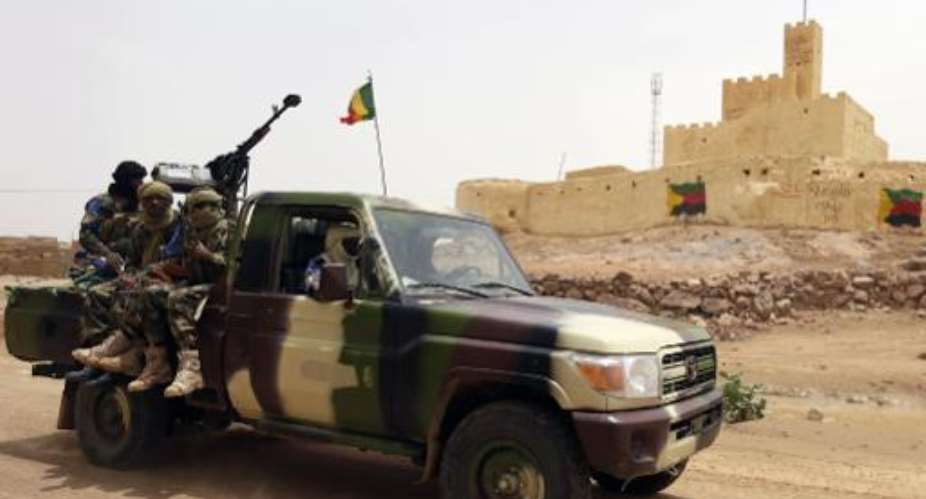Bamako (AFP) - Mali's main Tuareg-led rebel alliance killed three soldiers on Monday in an ambush in the west African nation's restive desert north, military sources told AFP.
The Coordination of Azawad Movements (CMA) attacked the troops as they slept early in the morning, about 100 kilometres (62 miles) south of the ancient caravan city of Timbuktu, a Malian army officer said on condition of anonymity.
"We are at the scene. A delegation of the governorate of Timbuktu just arrived in Maoude to establish the facts," said the source, adding that the attackers came in two vehicles.
Confirming "the death of three Malian soldiers on Monday in a rebel attack", a Timbuktu-based source in MINUSMA, the United Nations peacekeeping mission, described the attack as "a serious violation of the ceasefire that endangers peace".
"There was no fighting -- this was a surprise attack," added the source.
Official spokesmen for the army and the CMA were not immediately available for comment.
The attack came just a day after a local teacher told AFP some 4,000 inhabitants had fled the area ahead of the scheduled departure of an army unit charged with protecting them.
"The army unit is due to leave the locality today to secure another place and will not be replaced," Brahima Dicko said on Sunday.
"The people should not be abandoned. We are very concerned," he added.
- Tuareg uprisings -
The government and several armed groups signed a peace accord on Friday in a ceremony attended by numerous heads of state but which was missing the crucial backing of the CMA.
The alliance had provisionally initialled the document a day earlier but is demanding concessions and its three principal factions did not attend the rubber-stamping ceremony in the Malian capital Bamako.
The so-called "Algiers Accord" aims to bring stability to the north, the cradle of several Tuareg uprisings since the 1960s and a stronghold for al-Qaeda-linked jihadists who have been regrouping since they were ousted by the French in 2013.
It was signed by Malian Foreign Minister Abdoulaye Diop, three representatives of pro-Bamako militias and two minor members of the CMA rebellion, as well as a team of mediators led by Algeria.
The international community has been increasing pressure on the CMA to get on board the peace process as a means of isolating the jihadists, particularly since an Islamist attack on March 7 in Bamako in which two Europeans died.
The televised ceremony -- which follows months of UN-backed negotiations -- went ahead against the odds amid repeated recent violations of a ceasefire deal agreed between the army and various pro-government and rebel militias.
- Amputations and executions -
But it was largely devoid of substance without the signatures of the Tuareg-dominated National Movement for the Liberation of Azawad (MNLA) and High Council for the Unity of Azawad. The Arab Movement of Azawad (MAA) was also absent.
Mali was shaken by a coup in 2012 which cleared the way for Tuareg separatists to seize the towns and cities of the vast northern desert.
Militants linked to Al-Qaeda then overpowered the Tuareg to take control of northern Mali for nearly 10 months, imposing a brutal interpretation of Islamic law with punitive amputations and executions.
A French-led military offensive ousted the militants but the country remains deeply divided, with the Tuareg and Arab populations of the north accusing sub-Saharan ethnic groups in the more prosperous south of marginalising them.
Northern Mali has seen an upsurge in attacks by pro-government militias and various factions of the Tuareg-led rebellion, leaving many dead on both sides.
The Algiers Accord calls for the creation of elected regional assemblies but not autonomy or federalism, in deference to the concerns of the government about separatism.
The CMA has said it will not accept a deal without an amendment recognising "Azawad", the name used by the Tuareg for the northern part of Mali, as a "geographic, political and juridical entity".





 Whoever participated in the plunder of the state must be held accountable – Jane...
Whoever participated in the plunder of the state must be held accountable – Jane...
 A vote for John and Jane is a vote to pull Ghana from the precipice of destructi...
A vote for John and Jane is a vote to pull Ghana from the precipice of destructi...
 I’ll repay your abiding confidence with loyalty, understanding and a devotion to...
I’ll repay your abiding confidence with loyalty, understanding and a devotion to...
 ‘I’ve learnt deeply useful lessons for the future' — Serwaa Amihere breaks silen...
‘I’ve learnt deeply useful lessons for the future' — Serwaa Amihere breaks silen...
 I’m sorry for the embarrassment – Serwaa Amihere apologises for leaked sex video
I’m sorry for the embarrassment – Serwaa Amihere apologises for leaked sex video
 Dumsor: Matthew Opoku Prempeh not in charge of Energy sector – Minority
Dumsor: Matthew Opoku Prempeh not in charge of Energy sector – Minority
 Adu Boahen’s murder: Police arrest house help who was in possession of deceased’...
Adu Boahen’s murder: Police arrest house help who was in possession of deceased’...
 Akufo-Addo nominates Felicia Attipoe as Tema West MCE
Akufo-Addo nominates Felicia Attipoe as Tema West MCE
 Election 2024: I can't have someone I defeated twice as my successor – Akufo-Add...
Election 2024: I can't have someone I defeated twice as my successor – Akufo-Add...
